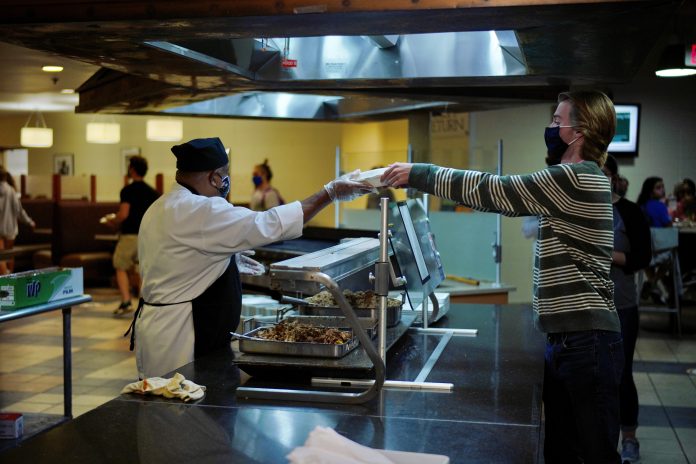Due to the COVID-19 pandemic, Dining Services at the College of William and Mary has had to implement several changes, including new food offerings, safety regulations, events to increase safety and promote socially distant dining. Some of the most noticeable differences from year prior include the introduction of Sadler Express, a new take-out dining option and safety measures such as plexiglass barriers, increased take-out options and directional signage throughout the dining halls. Additionally, Dining Services is trying to respond to student concerns by encouraging more outdoor eating and maintaining cleanliness within the dining halls.
Dining Services Marketing Director Melissa Strain and her team: Retail Director Jason Vercammen, Sadler Operations Director Steve Moyer, Marketing Coordinator Monica Moyer and Associate Director of Marketing, Communications and Licensing, Auxiliary Services Eden Harris spoke on the changes implemented within the dining halls this fall.
“Some of the major changes this fall include physical distancing and directional signage throughout the dining operations, touchless payment options, reducing seating in dining rooms due to physical distancing measures, and more robust to go options,” said Strain and the Dining Services team.
Dining services began using a new technology to allow students to pre-order food, check nutritional and allergy information, and examine the dining hall menus.
These options are available throughout all of the main Dining Halls on campus to allow students to eat in a safer environment to reduce their chances of contracting COVID-19. These new measures by the College’s Dining Services are in accordance with guidelines from the Virginia Department of Health and the Center for Disease Control and will be updated as those guidelines evolve.
As a first-year student entering college in the midst of the pandemic, Brigid Rawdon ‘24 expressed some concerns about the dining options available and some of the safety regulations put into place.
“It’s so hard to navigate the dining halls because of all of the directional arrows,” Rawdon said.
“It’s so hard to navigate the dining halls because of all of the directional arrows,” Rawdon said. “I would also like to have all of the dining halls open for every meal. On the weekends you can only go to the Caf for breakfast, which feels like a disaster because of COVID because it forces the entire student body to be at the same place at the same time.”
Rawdon also expressed concerns about seeing numerous Dining Services employees not wearing their masks correctly.
Dining Services spoke on the regulation of proper safety techniques.
“When we have team members who forget, we immediately work with them to remind them for their safety and the safety of the community,” Strain and the Dining Services team said.
Additionally, members of the Dining Services staff underwent robust training and complete a daily health assessment before reporting to work every day.
“I was honestly really impressed with the changes to Dining Services,” said Alyssa Imorde ‘23. “They have really given a lot of effort.”
“I was honestly really impressed with the changes to Dining Services,” said Alyssa Imorde ‘23. “They have really given a lot of effort.”
Despite the challenges the pandemic is posing to sustainability, Dining Services is trying to remain as sustainable as possible.
“We are using compostable disposables where possible,” Strain and the Dining Services team said. “Student Assembly was helpful in adding 6 new 96-gallon public compost bins around campus.”
Rawdon also mentioned how she was impressed with the food options available for students with dietary restrictions.
“The highest population of people I see wearing masks incorrectly are dining hall workers,” Rawdon said. “The fact that they were wearing their masks incorrectly while handling food was very concerning, and I think this was a reason why my roommate went home and switched to remote learning this semester.”
Every dining hall has areas for students with dietary restrictions, such as Simply To Go in Marketplace, and Simple Servings in Center Court and the Commons. Additionally, there are no self-service areas in any of the dining halls this semester, which decreases the risk of cross contamination between various foods and allows for less contact between students.
To encourage outdoor eating, and to-go options, new food options have also been added. One of these was the introduction of Sadler Express, a new dining option in Sadler with a pasta bar and prepackaged options which Imorde was really impressed by. Additionally, there are weekly “Cookouts at Caf” where creative and unique food options are served that encourage students to eat outside and reduce density within the dining halls. Dining Services also has swipe+ socials at Sadler, where students can pre-order a specialty meal, such as steak or a low country boil, with a dining swipe and an additional charge.
Another adaptation Dining Services has had to make, was catering to the College’s quarantine housing, Richmond Hall. Traditional meals are provided to the residents at Richmond, along with other options.
“W&M Dining has worked with Conference Services and Tribe Market to set up a pantry where students can order snacks and sundries while they are there,” Strain and the Dining Services team said.
Additionally, virtual s’mores events have also been organized for the residents of Richmond hall, so they can connect virtually while having a snack.
“I think they are doing their best,” said Imorde. “Me and a lot of other students appreciate what Dining Services are doing for us during this time.”
“I think they are doing their best,” said Imorde. “Me and a lot of other students appreciate what Dining Services are doing for us during this time.”

